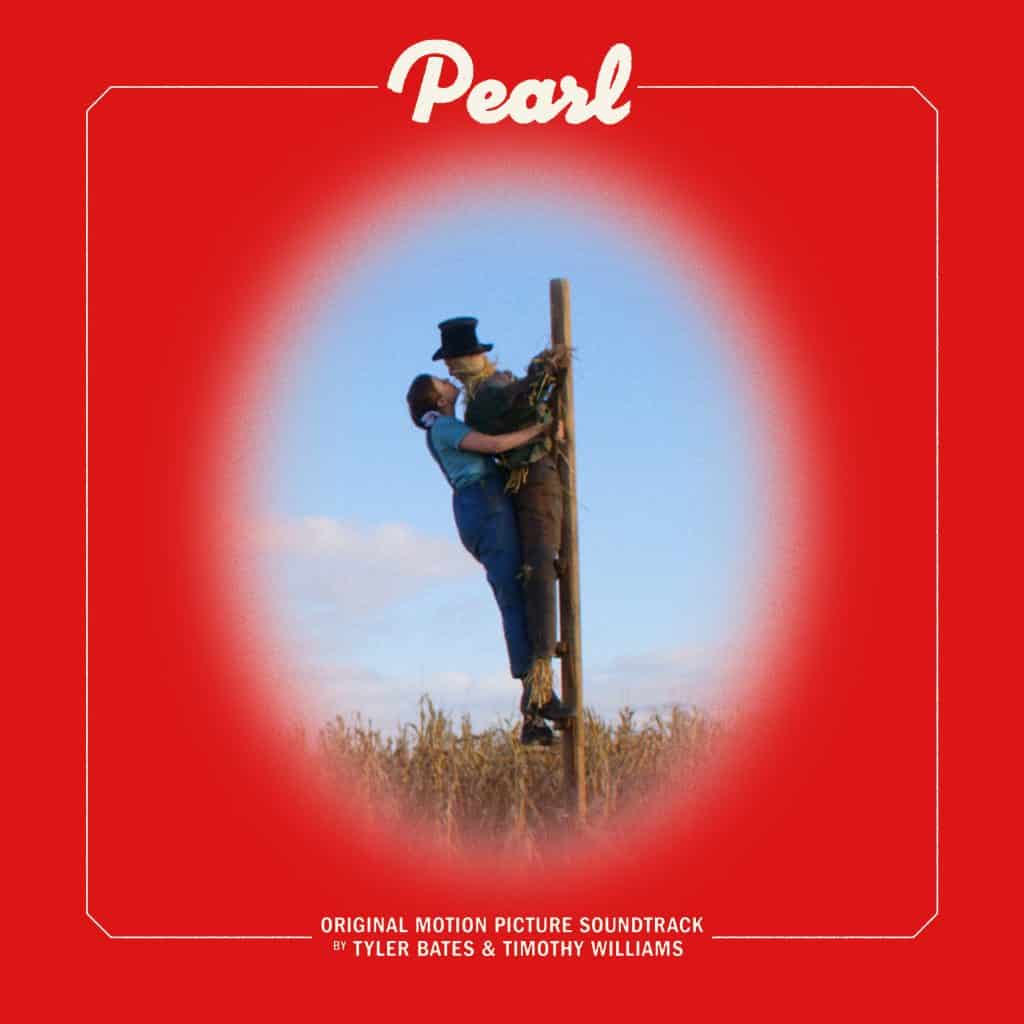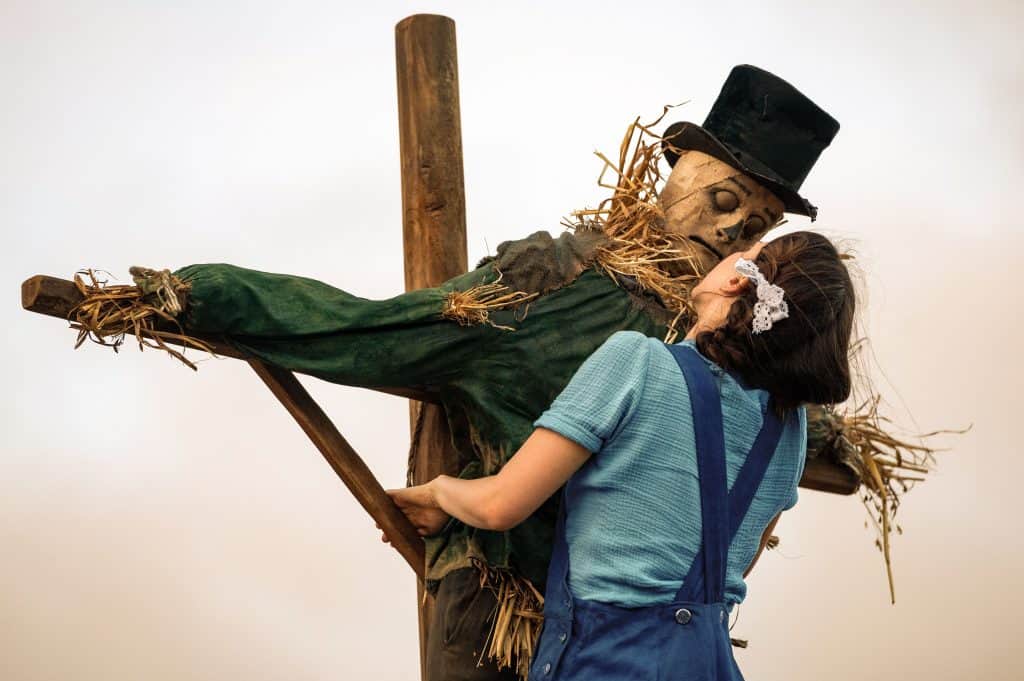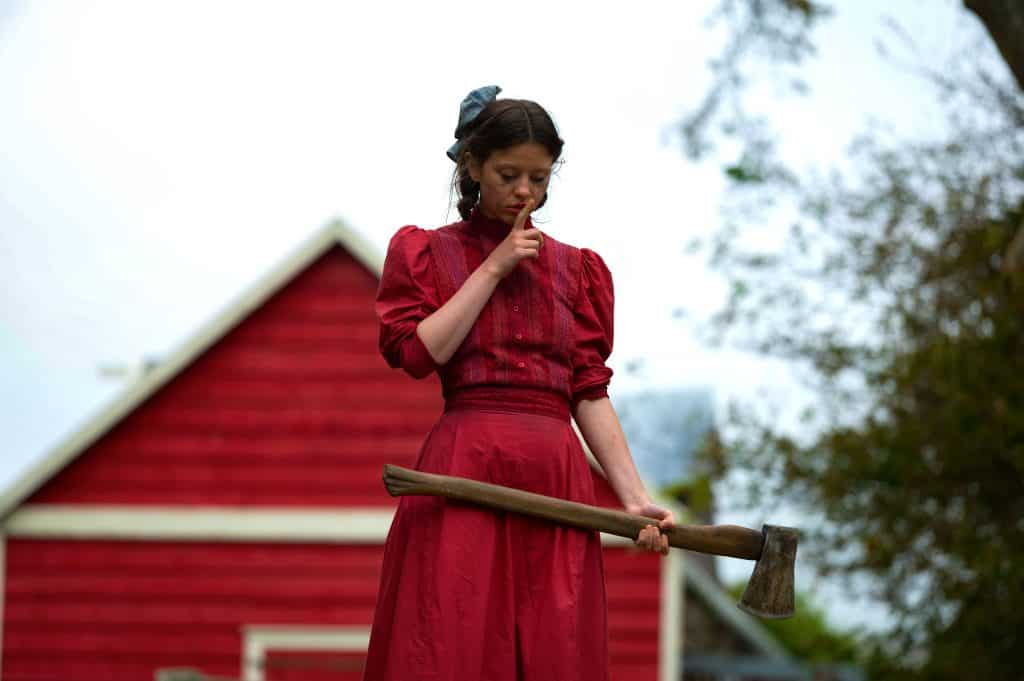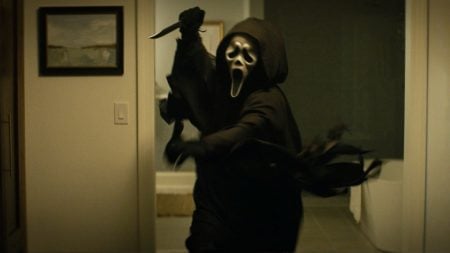(Welcome to “Notes on a Score,” GVN’s interview series highlighting the composers and musicians behind some of the year’s most acclaimed films and television series.)
The following article includes spoilers for Pearl.
Everybody’s still talking about Pearl, horror’s latest “it” girl. Mia Goth and her committed lead performance in Ti West’s X prequel has only garnered a Spirit Award nomination, but horror fans around the world consider her performance to be one of the best of the year. Even The Academy tweeted a video of her performance, despite the organization’s bias against the genre when it comes time for the actual ceremony.
However, alongside the performance, the film’s score, co-composed by frequent collaborators Tyler Bates and Tim Williams, has received plenty of acclaim itself. Williams believes they both go hand in hand. “Mia Goth’s performance was incredible,” he says. “She’s definitely one of the few serial killers that’s ever made me fall in love with her.”
“In any horror film, if you don’t care about the characters, then there’s no stakes. That, for me, is an important thing to try to represent musically.”
[youtube https://www.youtube.com/watch?v=CyvlI6Nd_Wo]
The film’s main title, which was released prior to the full album, introduces Pearl and her “yearning,” as Williams described it. “The main title was a way to capture her dream – to be a dancer and to be up on the silver screen. It ultimately becomes a theme that gets twisted and turned as things get darker and darker.”
“That was part of the fun of a score like this, where you can take a theme but then really distort it and change it throughout the film as a reflection of where her mind is at.”
Pearl takes place in 1918, right at the onset of the Golden Age of Hollywood. It was an era in film history responsible for talkies, technicolor, and revered classics like Gone With The Wind and The Wizard of Oz. Ti West has labeled the era, including Oz, as a direct influence on the film’s aesthetic, and Williams was acutely aware of those inspirations while composing alongside Bates.
“Even in the Golden Era of Hollywood film scoring, there’s a tremendous number of films that are iconic for that horror language,” clarified Williams. “Psycho is legendary. There was a lot of stuff to draw on. [For the dance sequences,] orchestrally, it was trying to capture the wonderful film language of the follies and big dance sequences from the 40s and 50s.”
“You don’t often have the opportunity to write those kinds of things in most films, so the whole film was just such an incredible opportunity.”
Williams spoke to GVN about his unique experience co-composing Pearl, what he loves about collaborating with Bates, and his newfound love for Game of Thrones.
The following interview has been edited for length and clarity.
–

Larry Fried: There has been a lot of love for Pearl’s score. People have seemed to really engage with it. How has it felt seeing the reactions?
Tim Williams: When you compose a film score, you always hope that people will connect with it while you’re in your dark cave, as I call it, writing away. For me, Pearl was one of those films that, when I watched it, I immediately was drawn to it. I thought the film was absolutely gorgeous and Mia Goth’s performance was incredible. My hope was to match that and help bring some kind of musical identity to the film. To have people really engage with the film and love the style of the music is pretty much all you hope for as a composer. I was very excited about that.
Fried: The score feels very appropriate for a horror film, but there are also those classic Hollywood elements in it as well and the fusion of that has captured a lot of people’s attention. What were the horror influences that you thought about when finding a way to balance both the classical, Hollywood sensibilities as well as the horror elements?
Williams: When [co-composer Tyler Bates and I] jumped into the score, one of the things we heavily discussed was what tone we wanted for this film. It was made very clear: we want this period sound of a 40s film. Even in the Golden Era of Hollywood film scoring, there’s a tremendous number of films that are iconic for that horror language. Psycho is legendary. There’s a huge number of really fantastic Alfred Hitchcock style horror films, like The Birds. So, in doing our homework and listening to the scores from that period, there was a lot of stuff to draw on.
I think, when you do a horror film, you need to be able to empathize with the characters. That was the amazing thing for me about Mia Goth. She’s definitely one of the few serial killers that’s ever made me fall in love with her. I wanted to hug her. I wanted to say, “It’s all going to be okay,” but you knew if you looked down there’d be a knife in your stomach. I think, in any horror film, if you don’t care about the characters, then there’s no stakes. You’re not invested in the film. That, for me, is an important thing to try to represent musically.
The main title was a way to capture her dream – to be a dancer and to be up on the silver screen. That yearning was something Tyler and I discussed trying to capture in the opening scene. It ultimately becomes a theme that’s used throughout the film and gets twisted and turned as things get darker and darker. That was part of the fun of a score like this, where you can take a theme but then really distort it and change it throughout the film as a reflection of where her mind is at.
Fried: I would love to talk about the dance sequences, both with the scarecrow and the wonderful hallucination toward the end of the film. When scoring these dance sequences in particular, was there a specific focus in the orchestration or the musicality that made them a unique part of the composing process?
Williams: One of the things that was particularly difficult about those sequences was that they were not shot to any music, so the first challenge was to try and find the rhythm of the scene and create a tempo map that would make it look like the music came first. The first scarecrow scene is a bit of an Easter Egg in that it’s ‘Oui, Oui, Marie,’ which was a song featured in X. Tyler and Chelsea [Wolfe, co-composer] did a phenomenal cover version. When she goes into the movie theater, that’s the song that’s playing on the screen as well. It was actually Ti’s idea for that sequence to be how she’s imagining herself dancing in her mind. Orchestrally, we wanted to create, again, that Golden Era of Hollywood and those wonderful dance movies.
It was similar with the second dance sequence, which was a lot of fun. Again, very tricky to map it out, but once we had the map, the ragtime that the pianist is playing suddenly becomes this big dance number. And again, orchestrally, it was that same idea of really trying to capture the wonderful film language of the follies and big dance sequences from the 40s and 50s. It’s a lot of fun and you don’t often have the opportunity to write those kinds of things in most films, so the whole film was just such an incredible opportunity.

Fried: From what I’m gathering, it sounds like the film was shot entirely before any music was written. Is that a traditional process for you, or something new? Also, what was the relationship between the edit and the score? Did they talk to each other at all?
Williams: That’s a really great question because that’s something, as a composer, you deal with all the time. The edit was done and the film was locked, which is incredibly rare these days. More often than not, you’re constantly chasing picture lock. It’s something that has been happening since the advent of computerized editing. A lot of classic film scores were composed to a locked picture. The advantage of that is you can write something and find the pacing of the scene – where the changes and the shifts in the music need to occur – and, if it’s locked, you know that your goal posts are not going to change.
On most films I work on, you’ll write a sequence and go, “Yeah, that feels really solid.” Then, a week later, boom, the film’s completely re-edited and none of the music works anymore. You’re constantly having to rewrite cues you already feel like you’ve done. Having a locked cut was something that Tyler and I really appreciated. It does affect the music because you can plan the arc of the music over the entire film. You can really plan where the themes are going to recur, where the pacing needs to accelerate, where it can pull back and just support the drama. If we were talking about a tone change or a note, it was very specific.
Fried: It sounds like you guys harkened back to the production process of the exact era that you were trying to capture musically. It goes hand in hand.
Williams: Yeah. It helped because we had a very short timeline to get it done. We had eight weeks to write the score, so it was almost a stream of consciousness. If there was editing going on as well, I don’t know if we would have been able to accomplish it in time. Definitely a request to all filmmakers is please give us locked cuts.
Fried: This is a very rare film in that there are two credited composers. The composition team is vast beyond the composer for every film, but what does it mean when you have two composers on a project? What does that collaborative process look like that would be different if it were only just one composer?
Williams: I think one of the biggest things in the process of writing music for a film is that it’s a very isolating process. Again, going back to this idea of working in your dark cave, you’re there by yourself and the only people you’re getting feedback from is a director or a production team. It can be a daunting task because you’re desperately trying to find the right tone and the right music. When you have someone like Tyler who has so much experience – and we’re close friends, we’ve worked together for 20 years – it’s a great process because it gives you a second ear right away.
Even before I send stuff to the director, he can say to me, “Why don’t you try this?” or “Why don’t you approach this slightly differently here?” Vice versa if he’s written something and I might have an insight or something from my perspective. I love collaborations and I think you can get better results because you have that back and forth. You end up being a team. Tyler and I have a shorthand and I’m very aware of his sensibilities, so to have an opportunity like this where I can work with him in this kind of a way is a great feeling. You can really try and create something special, which hopefully we did with this score.

Fried: I would say you definitely did. I know that your previous credits include “additional music” for a number of films, including collaborations with Tyler. I don’t think that even ardent moviegoers understand the concept of what it means to have a credit for “additional music” versus having a credit as a composer. What are the differences between those two credits and is there a shift in your collaboration with Tyler doing additional music as opposed to co-composing?
Williams: Those of us who are familiar with the process of scoring films know that it’s quite a daunting process. You often have a very limited amount of time. It is sort of “all hands on deck” on any film you do, in whatever capacity. I do conducting for a lot of composers but, if I’m conducting, I’m still sort of involved in creating the music. When I become more involved in a process, like orchestrating and conducting, which I’ve done on a lot of projects where I’m not involved in the music other than that, it’s still a tremendous amount of work. Over the years, one of the exciting things has been to do different aspects of music. I love every aspect.
Tackling an entire film as one composer is a really daunting task. If you really dug deep, it’s pretty rare that you’d have one composer compose an entire score, even across the board. You always have a team. Even when I’m orchestrating. I have a team of really phenomenal people. I honestly don’t know if there’s a way you can do it without that support. It’s a team sport and it just has to be that way. If you have a director, they’ll have some really good assistant directors. Same with visual effects or stunts or lighting or any of the departments there. It takes an army to get these projects up. I enjoy being involved in whatever capacity, whether it’s full-on composing or orchestrating or conducting. It is still part of crafting music, which is really my passion.
Fried: I’m always curious to hear about other projects that artists are watching and/or listening to that are inspiring them. Are there any films or albums or other musical projects that you’ve been listening to or watching over the last few months?
Williams: I just started watching House of the Dragon, which I’m really enjoying. As a precursor to that coming out, I realized I had stopped watching Game of Thrones. [Spoiler Warning for Game of Thrones.] I’m a huge fan of Sean Bean (Lord Eddard Stark), so once they killed him at the end of episode one, I was done. I boycotted it for eight years. [laughs] Then House of the Dragon came out, so I had the dubious pleasure of being able to watch the entire show from beginning to end.
I have to say, it was quite an incredible experience, and I thought, musically, Ramin [Djawadi, show composer] did such an incredible job with that series. The music is so good. That was probably the thing that has been inspiring me recently. It was tricky to get past Sean Bean, but I was determined to keep going forward and see what else happened. Then, of course, they kill off Jason Momoa (Khal Drogo) and Charles Dance (Lord Tywin Lannister). It was a very scarring process for me. [laughs]
[youtube https://www.youtube.com/watch?v=TZE9gVF1QbA]
Fried: We have a lot of big Game of Thrones fans in our readership. Are there any themes in particular throughout the series that you think are really evocative?
Williams: Obviously, for me, the theme song itself is incredible. It’s such a powerful theme, but what I particularly liked was the way it got mashed up and reworked throughout the series. Toward the end, you have that wonderful scene of the dragon flying over and destroying the city and Ramin did this very cool, almost half-time version of it. It was sort of like what we spoke about with Pearl, where it’s like a dysfunctional, really horrific version of the theme. It’s slowed down, sort of in half-time as this epic destruction is occurring, and she’s tipping over into her anger and destroying the city.
These are very old techniques, but it’s not something you get an opportunity to do a lot with modern scoring – where you can take a theme and really twist it and turn it. As a musician and as someone who appreciates music, I love it when you hear different instantiations of a melody and different approaches to it, but you still recognize that the melody’s there. Maybe it’s broken down or it’s cut into chunks or it’s just a few notes from it. I thought it was very skillfully and beautifully done.
Pearl is now available on DVD, Blu-ray, and VOD. The soundtrack, co-composed by Tyler Bates and Tim Williams, is now available on all streaming platforms. The soundtrack on vinyl is currently available for pre-order.

Larry Fried is a filmmaker, writer, and podcaster based in New Jersey. He is the host and creator of the podcast “My Favorite Movie is…,” a podcast dedicated to helping filmmakers make somebody’s next favorite movie. He is also the Visual Content Manager for Special Olympics New Jersey, an organization dedicated to competition and training opportunities for athletes with intellectual disabilities across the Garden State.





